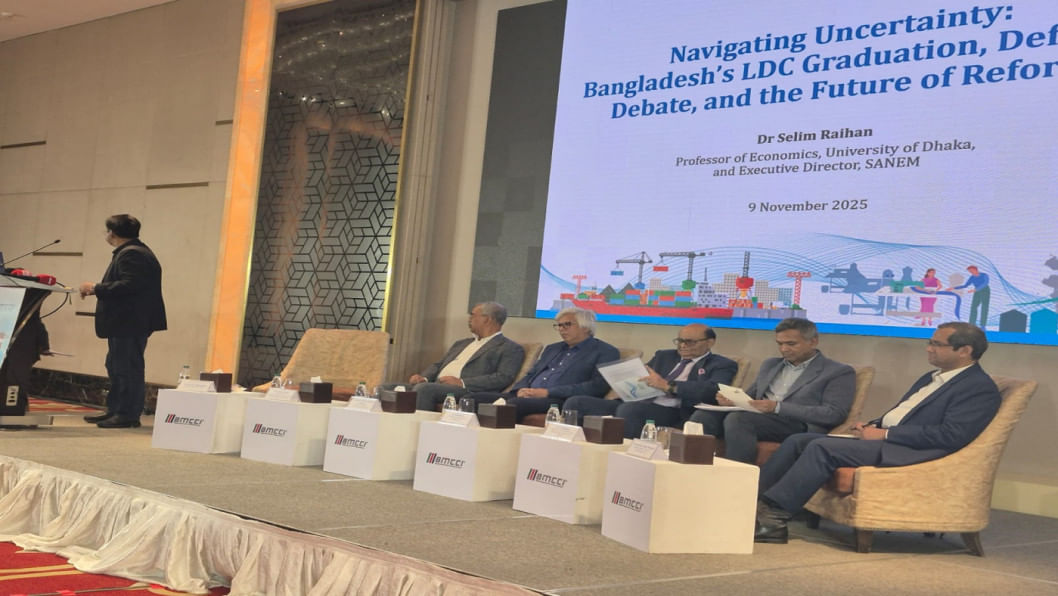LDC graduation must drive deeper reforms: experts

As Bangladesh nears its 2026 graduation from Least Developed Country (LDC) status, economists and business leaders have urged the government to use the milestone as a turning point for deeper reforms, stronger competitiveness, and global integration rather than mere celebration."Graduation itself cannot be deferred. We are working to minimise its trade-related shocks," said Commerce Secretary Mahbubur Rahman at a seminar titled "LDC Graduation: Challenges and Prospects", organised by the Banglad...
As Bangladesh nears its 2026 graduation from Least Developed Country (LDC) status, economists and business leaders have urged the government to use the milestone as a turning point for deeper reforms, stronger competitiveness, and global integration rather than mere celebration.
"Graduation itself cannot be deferred. We are working to minimise its trade-related shocks," said Commerce Secretary Mahbubur Rahman at a seminar titled "LDC Graduation: Challenges and Prospects", organised by the Bangladesh-Malaysia Chamber of Commerce and Industry (BMCCI) at the Sheraton Dhaka on Sunday.
Rahman said the government is taking steps to secure trade privileges and ensure a smooth transition after 2026.
He said that key export markets particularly the European Union will continue offering duty-free access until 2029, covering around 45 percent of Bangladesh's exports. However, the US has not extended any such facility since 2013.
Other countries, including Japan, South Korea, China, Australia and Canada, continue to offer different forms of preferential access, together accounting for over 90 percent of Bangladesh's exports.
Rahman also confirmed that the government has requested a readiness assessment from the UN Committee for Development Policy (UN CDP), which is expected to send a mission later this month to consult with stakeholders.
Selim Raihan, executive director of the South Asian Network on Economic Modeling (Sanem), criticised the government's Smooth Transition Strategy (STS), describing it as "ambitious but superficial."
"It identifies the right issues like macroeconomic stability and export diversification but avoids addressing deep-rooted problems like corruption, bureaucratic inertia, and fiscal mismanagement," he said.
Raihan warned that without transparency and political ownership, the strategy risks becoming "just another decorative document."
He also cautioned that private sector requests to delay the transition, though understandable, could send the wrong signal to global investors. "A delay might buy time but risks destroying reform momentum. Deferral should be a reform window — not a retreat," he said.
LDC graduation must not become a "penalty for progress," said Faruque Hassan, former president of the Bangladesh Garment Manufacturers and Exporters Association (BGMEA).
"Despite our export growth and human development achievements, challenges like high interest rates, energy crises, and rising business costs threaten our competitiveness," he said.
Hassan called for financial sector reforms, including the introduction of green credit lines and better policy coordination to remove hidden costs caused by tariffs, licensing, and regulatory inefficiencies.
He also urged greater market and product diversification, calling for Free Trade Agreements (FTAs) and Economic Partnership Agreements (EPAs) with the EU, the UK, Japan, Canada, and others. "We must move up the value chain to survive tariff shocks," he said.
Highlighting Bangladesh's progress in sustainable manufacturing, Hassan noted that the country now has over 100 platinum-rated LEED-certified garment factories, with more than 500 more in the pipeline. "We must show the world that we are not only cost-competitive but also responsible," he added.
Khondaker Golam Moazzem, research director at the Centre for Policy Dialogue (CPD), said he remains optimistic about the private sector's capacity to manage the transition but emphasised the need for political and economic stability.
"Despite concerns, I believe the private sector is competent enough to adapt. But recent political uncertainty has slowed business activity. Once the new government is in place, things will stabilise," he said.
Moazzem added that the private sector might need an additional year after graduation to fully adjust, urging the government to maintain supportive policies and a stable macroeconomic environment.
Anwar-ul-Alam Chowdhury Parvez, president of the Bangladesh Chamber of Industries (BCI), said the business community supports graduation but seeks better preparation.
"We need government support to reduce the cost of doing business. Our manufacturers are struggling with high utility costs, interest rates, and delays at Chattogram port," he said.
Parvez also pointed to rising "miscellaneous costs" for businesses, contradicting claims by the Bangladesh Investment Development Authority (Bida) that the investment climate has improved.
"Day by day, these hidden costs are increasing. Without resolving energy and port issues, we can't expect to be competitive," he said.
Abdur Razzaq, chairman of the Research and Policy Integration for Development (RAPID), said the three-year transition period must be used wisely for meaningful reform.
"Extra time is a privilege but only valuable if we act," he said. Razzaq called for steady improvements in energy security and urged the government to treat the STS as a "living document" open to updates and accountability.
"Global competitiveness now includes sustainability and supply chain reliability. Bangladesh must adapt quickly or risk falling behind," he warned.
He said Bangladesh's graduation offers a great opportunity, but success will depend on genuine reform, coordination, and strong political will.
The seminar was moderated by Zaidi Sattar, chairman of the Policy Research Institute, while BMCCI President Shabbir A Khan and Secretary General Md Motaher Hoshan Khan also spoke.